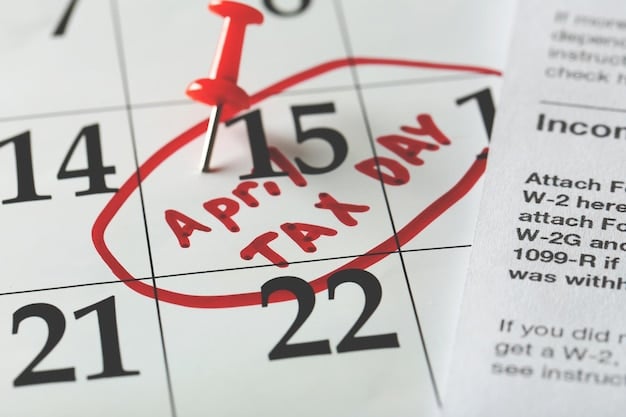Tax Planning for Freelancers: Smart Strategies to Stay Compliant

Tax planning for freelancers involves strategies to minimize tax liabilities, ensure compliance with IRS regulations, and maximize savings through deductions and credits available to self-employed individuals.
Navigating the world of taxes as a freelancer can feel overwhelming. However, with effective tax planning for freelancers, you can stay compliant with IRS regulations, save money, and reduce the stress associated with tax season. Let’s explore some smart strategies to help you take control of your freelance finances.
Understanding Your Tax Obligations as a Freelancer
As a freelancer, you’re considered self-employed, which means you’re responsible for both employer and employee portions of taxes like Social Security and Medicare, known as self-employment tax. Understanding these obligations is the first step in effective tax planning.
Self-Employment Tax Basics
Self-employment tax primarily covers Social Security and Medicare taxes. Unlike traditional employees, freelancers pay both halves of these taxes, which can significantly increase your tax burden.
Estimated Taxes: Paying as You Earn
Freelancers typically need to pay estimated taxes quarterly to the IRS. This ensures you’re paying taxes on your income throughout the year, rather than facing a large bill at tax time.
- Calculate your estimated income and deductions for the year.
- Use Form 1040-ES to determine your estimated tax liability.
- Pay your estimated taxes quarterly through the IRS website or by mail.
Staying on top of your tax obligations is vital. Paying estimated taxes not only keeps you compliant but also prevents penalties.

Maximizing Deductions for Freelancers
One of the most effective ways to reduce your tax burden as a freelancer is to take advantage of all available deductions. Knowing what you can deduct and keeping accurate records is key.
Home Office Deduction: What You Need to Know
If you use part of your home exclusively and regularly for your freelance business, you may be able to deduct expenses related to that space.
Business Expenses: Write-Offs to Consider
Many business expenses are deductible, including costs for equipment, supplies, software, and professional development. Keep track of these throughout the year.
- Track all your business-related expenses diligently.
- Use accounting software or spreadsheets to categorize expenses.
- Consult with a tax professional to ensure you’re claiming all eligible deductions.
Maximize deductions for business expenses to help reduce taxable income. The more you track, the more potential savings you can unlock.
Retirement Planning for Tax Savings
Contributing to retirement accounts not only secures your future but also offers tax advantages in the present. As a freelancer, you have several options for retirement savings.
SEP IRA: A Simple, Powerful Option
A Simplified Employee Pension (SEP) IRA allows you to contribute a significant portion of your self-employment income, reducing your taxable income in the process.
Solo 401(k): Flexibility and Higher Contributions
A Solo 401(k) offers even more flexibility and can allow for higher contributions compared to a SEP IRA, especially if you’re both the employee and employer.
Planning your retirement allows you to save for the future while also benefiting from tax deductions in the present. Explore your options to find the best fit.
Health Insurance Deductions for the Self-Employed
Health insurance premiums can be a significant expense for freelancers. Fortunately, you may be able to deduct these premiums from your gross income.
Understanding the Self-Employed Health Insurance Deduction
You can deduct the amount you paid in health insurance premiums for yourself, your spouse, and your dependents, reducing your adjusted gross income (AGI).
Eligibility and Limitations
To qualify, you must not be eligible to participate in an employer-sponsored health plan, and the deduction cannot exceed your self-employment income.
- Keep detailed records of all health insurance premiums paid.
- Ensure you meet the eligibility criteria for the deduction.
- Calculate the deduction amount accurately to avoid errors.
The self-employed health insurance deduction makes healthcare more affordable and has a positive impact on your taxable income.

Leveraging Legal Structures for Freelancers (LLC, S Corp)
Choosing the right legal structure for your freelance business can have significant tax implications. Options like Limited Liability Companies (LLCs) and S Corporations (S Corps) offer both liability protection and potential tax advantages.
LLC vs. Sole Proprietorship: Tax Considerations
While a sole proprietorship is the simplest structure, an LLC can offer liability protection and may provide some tax benefits, depending on your situation.
S Corp Election: Potential Tax Savings
Electing to be taxed as an S Corp can allow you to pay yourself a salary and take the rest of your profits as distributions, potentially reducing your self-employment tax liability.
Consider consulting with a legal or financial advisor to determine the best legal structure for your freelance business. Your choice should align with your business goals and tax strategy.
Tracking and Record-Keeping Best Practices
Effective tax planning relies on accurate and organized record-keeping. Implementing best practices for tracking income and expenses can save you time and reduce stress during tax season.
Using Accounting Software and Apps
Accounting software and apps can automate much of the record-keeping process, making it easier to track income, expenses, and generate reports.
Maintaining Detailed Expense Records
Keep receipts, invoices, and other documentation for all business-related expenses. Organize these records in a way that makes it easy to find and access them.
- Choose accounting software that suits your needs and budget.
- Regularly update your records and categorize expenses.
- Back up your data to prevent loss of important information.
Keeping accurate and organized records streamlines tax preparation. This makes it easier to claim all eligible deductions and stay compliant.
Seeking Professional Tax Advice
Given the complexities of tax law, seeking professional advice from a tax advisor or accountant can be invaluable. A professional can provide personalized guidance and ensure you’re taking advantage of all available benefits.
When to Consult a Tax Professional
Consider consulting a professional if you have complex tax situations, are unsure about deductions, or want to optimize your tax strategy.
Finding the Right Tax Advisor
Look for a tax advisor with experience working with freelancers and self-employed individuals. Ask for referrals and check their credentials and qualifications.
Professional tax advice provides clarity and helps you navigate complex tax rules. It enables you to optimize your tax strategy and can reduce the risk of errors or penalties.
| Key Point | Brief Description |
|---|---|
| 📝 Estimated Taxes | Pay quarterly to avoid penalties. |
| 🏠 Home Office Deduction | Deduct expenses for your dedicated workspace. |
| 💰 Retirement Planning | Use SEP IRAs or Solo 401(k)s for tax savings. |
| 🏥 Health Insurance | Deduct premiums if self-employed. |
Frequently Asked Questions (FAQ)
▼
Estimated taxes are quarterly payments made to the IRS to cover income tax, Social Security, and Medicare taxes. Freelancers pay them because they aren’t subject to employer withholding, ensuring they meet their tax obligations throughout the year.
▼
The home office deduction allows you to deduct expenses related to a portion of your home used exclusively and regularly for business. To qualify, the space must be your principal place of business or a place where you meet clients.
▼
A Simplified Employee Pension (SEP) IRA is a retirement plan that allows freelancers to contribute a percentage of their self-employment income. It offers tax advantages by reducing your taxable income while saving for retirement.
▼
Yes, as a freelancer, you can typically deduct the amount you paid in health insurance premiums for yourself, your spouse, and your dependents, reducing your adjusted gross income (AGI). This deduction is subject to certain eligibility rules.
▼
Accounting software helps automate record-keeping, track income and expenses, generate reports, and ensure you’re accurately categorizing business expenses. This streamlines tax preparation and helps you claim all eligible deductions.
Conclusion
Effective tax planning for freelancers involves understanding your tax obligations, maximizing deductions, and leveraging available resources. By staying organized, seeking professional advice when needed, and making informed decisions, you can ensure compliance, reduce your tax burden, and secure your financial future.





